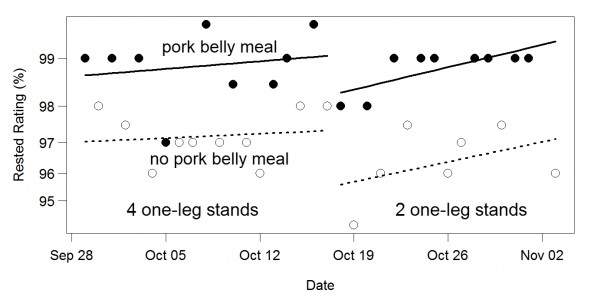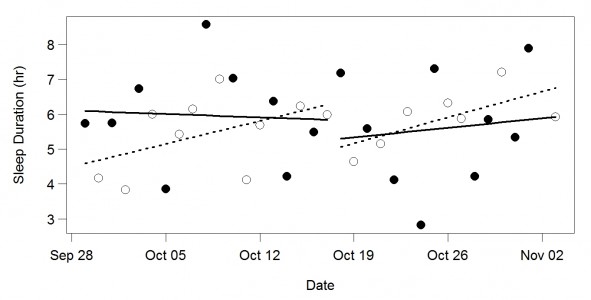A New York doctor named Jay Parkinson is skeptical about the appeal of self-measurement:
There is a very, very small subset of people who want to document their life according to their health— the quantified selfers. But this group is tiny because it’s just data geeks who are obsessed with data. They are people who truly believe data changes behavior.
As caricatures go, this is fair. The audience and speakers at Quantified Self meetups do appear to be “data geeks who are obsessed with data” and, yes, this is a tiny subset of people. I don’t put myself in that category. I have zero interest in “documenting” my life. I record a tiny amount of stuff and only stuff I think will make a difference. For example, I stopped measuring my blood pressure after it became clear it was low enough.
Parkinson continues:
Data gets old after a while. After about a month, for those who are not obsessed, it becomes meaningless. That is, unless you have an obsession with data. . . . Good luck trying to build a viable business around that group.
Yes, and “there is a world market for about five computers”, as the president of IBM supposedly said in the 1940s. I have measured myself for so long (decades) not because I am obsessed with data but because I reaped huge benefits. In the beginning, self-measurement showed me how to reduce my acne considerably more than my dermatologist’s advice alone. Later it led to all sorts of improvements: better sleep, better mood, lower weight, fewer colds, healthier gums, better balance, better brain function. Life-changing benefits. The fraction of adults who would like to sleep better, be in a better mood, lose weight, get fewer colds, and so on is very large — perhaps 99%. Is Starbucks a “viable business”? It is built around people needing stimulants (caffeine). An enormous number of products and services are about losing weight. One of the world’s most “viable business” is illicit drugs. I believe a large fraction of illicit drug use is self-medication for depression. (More: The day I posted this, I came across this: “She said heroin helped her fight depression.”)
There is nothing obvious about how I managed to improve my sleep, mood, weight and so on. The solutions I discovered via self-measurement were exceedingly surprising, at least to me. So there is nothing obvious about how to use self-measurement to improve one’s sleep, etc. Self-measurement is needed, yes, but it’s not the only thing that’s needed. I needed: 1. Wise choice of what to measure (e.g., measure the problem, not the solution — I don’t have a FitBit for example.) 2. Wise choice of what to change. (To improve my sleep, for example, I needed a good understanding of sleep research. “Common sense” was not enough.) 3. Experimental design skill. 4. Data analysis skill. To say data is boring (to most people) is like saying tires are boring (to most people). By themselves, tires have little use, just as data alone has little use. But they are part of something very useful.
Consider literacy. For a long time, the notion that “everyone would benefit from literacy” seemed ridiculous. Books were too expensive! There were so few of them. Only a tiny fraction of people (e.g., monks) knew how to read. It was hard to learn to read. Good luck basing a business on literacy! But eventually everything changed. Right now, few quantified selfers, as far as I can tell, seem to know how to learn something useful from their measurements. (When I had been doing it for a short time, I didn’t know either.) For example, Stephen Wolfram appears to have learned nothing of use from a huge amount of self-measurement. New measurement devices, like FitBit and so on, are like books — it is as if few people know how to read. But that can change.


 As do I. I wish I had left the second I discovered they hadn’t backed up my site, after saying they had. (They had backed up only a small fraction of it.) After that, my sites kept getting hacked. First, we moved this blog and www.sethroberts.net off Dreamhost. They stopped getting hacked. Then the Shangri-La Diet forums got hacked. We moved them off Dreamhost. No more hacking. The cost of even one incident of hacking is far more than you will ever save from their low rates.
As do I. I wish I had left the second I discovered they hadn’t backed up my site, after saying they had. (They had backed up only a small fraction of it.) After that, my sites kept getting hacked. First, we moved this blog and www.sethroberts.net off Dreamhost. They stopped getting hacked. Then the Shangri-La Diet forums got hacked. We moved them off Dreamhost. No more hacking. The cost of even one incident of hacking is far more than you will ever save from their low rates.